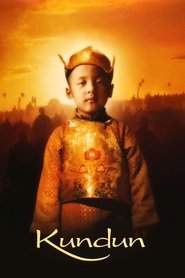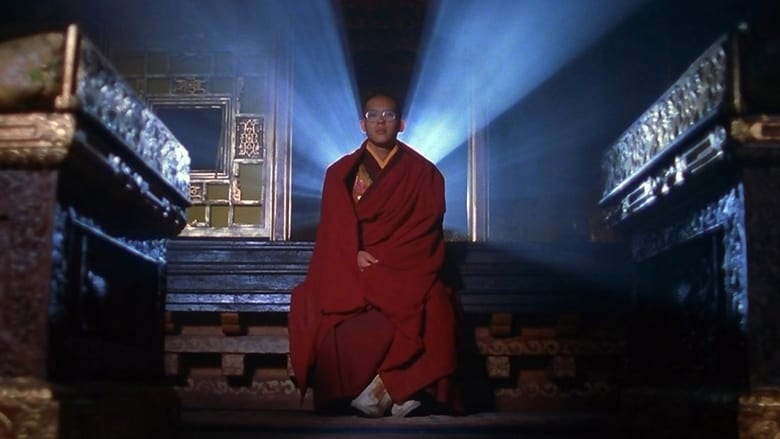“Kundun” (1997) is a film directed by Martin Scorsese that tells the story of the 14th Dalai Lama’s early life and his journey towards spiritual enlightenment. It presents a visually stunning and emotionally charged portrait of a young boy who becomes the spiritual leader of Tibet, navigating through political turmoil and finding his own path amidst chaos. With an exquisite blend of cinematic artistry, “Kundun” offers a deep reflection on the power of faith, resilience, and the indomitable human spirit in the face of adversity.

CLICK HERE🠣🠣🠣🍿_Watch Kundun 1997 English Subtitles_
Review
Kundun: A Journey into the Heart and Soul
Introduction:
In the realm of cinematic masterpieces, Kundun, directed by Martin Scorsese, stands as a profound exploration of the human spirit’s capacity for resilience and hope. Shot in breathtaking beauty, this film immerses audiences in the rich tapestry of Tibet’s history, culture, and spiritual traditions. Through Brené Brown’s signature vulnerability and empathy-driven lens, we delve into the depths of Kundun’s narrative and its impact on our collective consciousness.
Storyline:
Kundun invites us to follow the life of Tenzin Gyatso, played with remarkable grace by Tenzin Thuthob Tsarong. Born as an ordinary child in rural Tibet, he is recognized at an early age as the 14th Dalai Lama. As political unrest engulfs his homeland due to China’s invasion and occupation, Kundun faces a monumental challenge: should he stand firm and fight back or choose a path rooted in compassion?
Plot:
The plot unfolds like a poignant tapestry woven from threads of spiritual awakening, political turmoil, friendship, and sacrifice. Through intimate moments and breathtaking landscapes, Scorsese compels us to question how we navigate our own struggles amidst chaos. We witness Kundun’s evolution from a curious young boy to an inspiring global figure while grappling with the weighty responsibility thrust upon him.
Fact:
Kundun adheres closely to historical facts while also infusing artistic interpretation. Scorsese meticulously researched Tibetan history and consulted with Buddhist scholars to honor cultural accuracy. This dedication shines through every frame and dialogue exchange.
Casts:
The stellar ensemble cast brings depth and nuance to every character portrayal. Tenzin Thuthob Tsarong embodies Dalai Lama’s purity of heart with such authenticity that it feels as though we are privy to his innermost thoughts.
Quote:
As Brené Brown would aptly put it, “Vulnerability is not winning or losing, it’s having the courage to show up and be seen.” In Kundun, the Dalai Lama leads by example, showcasing the power of vulnerability as he confronts seemingly insurmountable challenges.
Acting and Characters:
Each actor breathes life into their respective roles, turning them from mere performances into captivating personas. Martin Scorsese’s brilliance in casting enables Kundun to transcend its limitation as a film and become a transformative experience for its viewers.
History:
Kundun offers us an intimate window into Tibet’s tumultuous modern history. It sheds light on the country’s struggle for independence against China’s authoritative grip and highlights the Dalai Lama’s unwavering commitment to non-violence.
Score and Popularity:
The film’s ethereal score, composed by Philip Glass, evokes a sense of spirituality that resonates deeply with audiences. Its popularity lies not only in its artistic merit but also in its ability to immerse viewers in a world shrouded in mystery and wonder.
Filming:
Scorsese’s meticulous attention to detail is evident throughout Kundun’s cinematography. The breathtaking landscapes of Tibet are showcased with awe-inspiring grandeur, transporting viewers to a mesmerizing realm filled with vibrant colors and serene expanses.
Evaluation:
Kundun has been widely regarded as one of Scorsese’s most ambitious projects, showcasing his versatility as a director beyond his usual gritty crime dramas. The film exemplifies his dedication to storytelling that touches our hearts while challenging our perceptions of what it means to be human.
Awards:
Kundun garnered critical acclaim upon release, receiving multiple accolades including four Academy Award nominations. Its recognition speaks volumes about its enduring impact on both cinematic and cultural landscapes.
Cinematography:
Roger Deakins’ ingenious cinematography captures the essence of Tibetan spirituality through beautifully composed shots that evoke a sense of awe and reverence. The camera work acts as a silent narrator, inviting us to reflect on the deeper layers of the narrative.
Opinion:
Kundun serves as a reminder that even in the darkest of times, hope can thrive. It challenges us to examine our own lives and question how we can foster compassion and understanding in the face of adversity.
Scenes:
From Kundun’s childhood encounter with an eagle to his spiritual journey through the harsh Himalayas, each scene is imbued with symbolic significance. Scorsese’s meticulous attention to visual storytelling ensures that every moment captivates and resonates.
Gossip:
Behind-the-scenes anecdotes reveal the filmmakers’ relentless pursuit of authenticity. From working closely with Tibetan refugees to recreating sacred rituals, Kundun is a testament to their commitment in honoring Tibetan culture.
Soundtracks:
Philip Glass’s mesmerizing score elevates Kundun into a realm beyond cinema. Its haunting melodies linger long after the credits roll, taking us on an emotional journey mirroring Kundun’s inner struggles.
Analysis:
Underneath Kundun’s breathtaking visuals lies an intricate exploration of power dynamics, religious faith, and cultural identity. Brown would encourage us to reflect on these themes and examine how they intersect with our personal lives.
Special Effects:
Kundun eschews flashy special effects for a more organic approach, emphasizing the story’s human elements above all else. This decision allows the film to maintain its emotional resonance while showcasing Scorsese’s masterful storytelling techniques.
Development:
The arduous journey from conceptualization to screen is a testament to Scorsese’s unwavering vision. Kundun’s development required countless hours of research, collaboration, and negotiation – all crucial elements in crafting a film that honors its subject matter.
Dialogue:
Every word uttered in Kundun carries weight and significance. The dialogue resonates deeply as it imparts wisdom and insights into the human condition, inviting viewers to ruminate on their own purpose and values.
Crews:
The film’s production crew, comprising talented individuals from various backgrounds, worked tirelessly to ensure the film’s authenticity. Their dedication shines through in every meticulous detail, creating a world that truly transports us to Tibet.
Criticism:
While Kundun received critical acclaim, it also faced backlash from those who felt it portrayed China in a negative light. Scorsese and the cast weathered these challenges with grace, standing firm in their belief that storytelling is a powerful tool for fostering empathy and understanding.
Production:
Kundun’s production was not without its challenges, particularly due to the sensitive nature of its subject matter. Yet, Scorsese’s unwavering commitment to telling this story with integrity propelled the project forward, resulting in a masterpiece that continues to resonate years later.
Editing:
Kundun’s editing breathes life into the narrative by seamlessly weaving together scenes of emotional intensity with moments of quiet reflection. It heightens our emotional connection to Kundun’s journey, allowing us a glimpse into his psyche as he navigates extraordinary circumstances.
Conclusion:
Kundun stands as a testament to the resilience of the human spirit and our capacity for profound transformation amidst adversity. Drawing upon Brené Brown’s ethos of vulnerability and empathy, this cinematic masterpiece invites us to explore our own path towards compassion and understanding. As we immerse ourselves in Kundun’s journey, we are reminded that in darkness lies an opportunity for growth and renewal – an invitation to embrace our shared humanity with open hearts.
Technical Data

- Release : 1997-12-25
- Runtime : 134
- Genre : Drama, History
- Cast : Tenzin Thuthob Tsarong as Dalai Lama (Adult), Tencho Gyalpo as Mother, Tsewang Migyur Khangsar as Father, Gyurme Tethong as Dalai Lama (Age 12), Robert Lin as Chairman Mao
- Crew : Roger Deakins as Director of Photography, Martin Scorsese as Director, Philip Glass as Original Music Composer, Ellen Lewis as Casting, Dante Ferretti as Production Design
- Revenue : $5,684,789
- Budget : $28,000,000
- Company : Touchstone Pictures, Dune Films
- Popularity : 13.471
- Summary : The Tibetans refer to the Dalai Lama as ‘Kundun’, which means ‘The Presence’. He was forced to escape from his native home, Tibet, when communist China invaded and enforced an oppressive regime upon the peaceful nation. The Dalai Lama escaped to India in 1959 and has been living in exile in Dharamsala ever since.
- Tagline : The destiny of a people lies in the heart of a boy.
